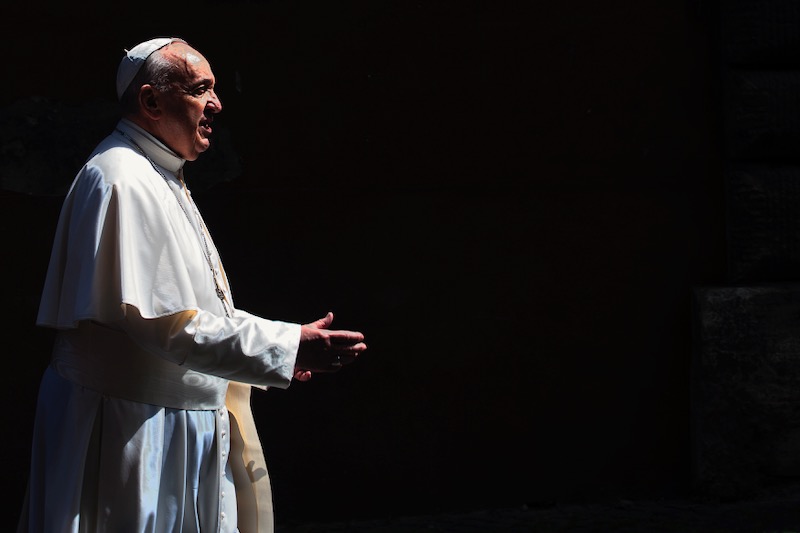There is a danger, Pope Francis has warned, that the world will be hit by a virus which is even worse than Covid-19: selfish indifference.
As governments struggle to chart an exit strategy from lockdown, and people adapt to the “new normal” of social distancing, the Pope wants the Church to help build a fairer world in the aftermath after the Coronavirus crisis.
A good place to start is by emphasising kindness, a virtue which can act as a vaccine to the virus of selfishness.
The Christian community should be ready to pump this vital antibody into the veins of the human family with the hope of creating immunity from the vested interests, profiteering and indifferent dismissal of those left on the waste heap of life as a result of Covid-19.
Throughout the pandemic, the benefits of kindness have been on display such as the taxi driver in Spain taking patients to hospital free of charge, Andrea Bocelli’s Easter Sunday performance from the Duomo in Milan and the hundreds of thousands who have volunteered to help Britain’s NHS.
We can see it in the change of attitude on immigration being detected in the UK with praise for Hassan, a recent arrival from Syria who is cleaning Covid hospital wards, and Associated Newspapers – a media group traditionally critical of migrants – welcoming Romanians coming to help with Britain’s harvest. Kindness begets kindness, and the debate on migrants could be moving away from demonising outsiders to recognising their contribution.
The Archbishop of Malta, Charles Scicluna, says it is kindness which makes us human, and points to the welcome offered to St Paul in the Bible.
“For the virtue of kindness I find my inspiration in the narrative of Acts 28: 1-2 which recalls that the natives of the island of Malta welcomed 276 people shipwrecked on their shores ‘with unusual kindness’,” he told me.
“Among these people was the Apostle Paul. The original in Greek uses the word ‘philanthropia’ which St Jerome translated into Latin as ‘humanitas’. I often reflect on the link between these two words: kindness implies a love of mankind (philanthropia) and is what makes us truly human (humanitas).”
Kindness, therefore, goes deeper than just being nice. It is one of the fruits of the Holy Spirit listed in St Paul’s letter to the Galatians, and it is a Church re-configured by the spirit which Francis wants to see in the future.
“If you ask me which book of theology can best help you understand this, it would be the Acts of the Apostles. There you will see how the Holy Spirit de-institutionalises what is no longer of use, and institutionalises the future of the Church. That is the Church that needs to come out of the crisis.”
In his homily marking Divine Mercy Sunday, the Pope pointed to the early Christian community as described in Acts, 2:44-45 where “all who believed were together and had all things in common; and they sold their possessions and goods and distributed them to all, as any had need.”
The Pope added: “This is not some ideology: it is Christianity.”
That early Christian community could be described as one where kindness was institutionalised. The description in Acts is often dismissed as an ideal impossible to realise, yet with the world facing the worst economic depression in 150 years, an economic model according to needs rather than greeds is becoming more urgent. Historians also point to the solidarity and spirituality of the early Church has uniquely capable of responding to catastrophes.
“Christianity was, therefore, a system of thought and feeling thoroughly adapted to a time of troubles in which hardship, disease and violent death commonly prevailed,” William H McNeill writes in “Plagues and Peoples”, an epidemiological history published in 1976.
Institutionalised kindness for those suffering financially will also be politically vital given that Covid-induced inequalities provide the perfect setting for a new wave of populist nationalism. Commentators have already pointed out how the Great Depression of the 1930s spawned Nazism and Communism, and with far-right leaders in Europe
“The present pandemic,” Francis said yesterday, “reminds us that there are no differences or borders between those who suffer. May we be profoundly shaken by what is happening all around us: the time has come to eliminate inequalities, to heal the injustice that is undermining the health of the entire human family.”
The kindness on display during Covid-19 has pointed to that untapped reservoir of human goodness in communities, but is so often forgotten or silenced. Despite fears about an uncertain future, evidence points to people appreciating the stronger sense of community that has developed as a result of the virus, and not wanting to go back to how things were before the pandemic.
“There needs to be a resurrection of our common life,” the Archbishop of Canterbury, Justin Welby, said on Easter Sunday. By continuing with acts of kindness, large or small, then that new life, and health, has a chance of emerging.
Read more:
“Do we have anything at all to be grateful for during the Covid-19 pandemic?”
“How the Covid-19 pandemic is leading to a new emphasis on mercy"



 Loading ...
Loading ...
What do you think?
You can post as a subscriber user ...
User comments (0)